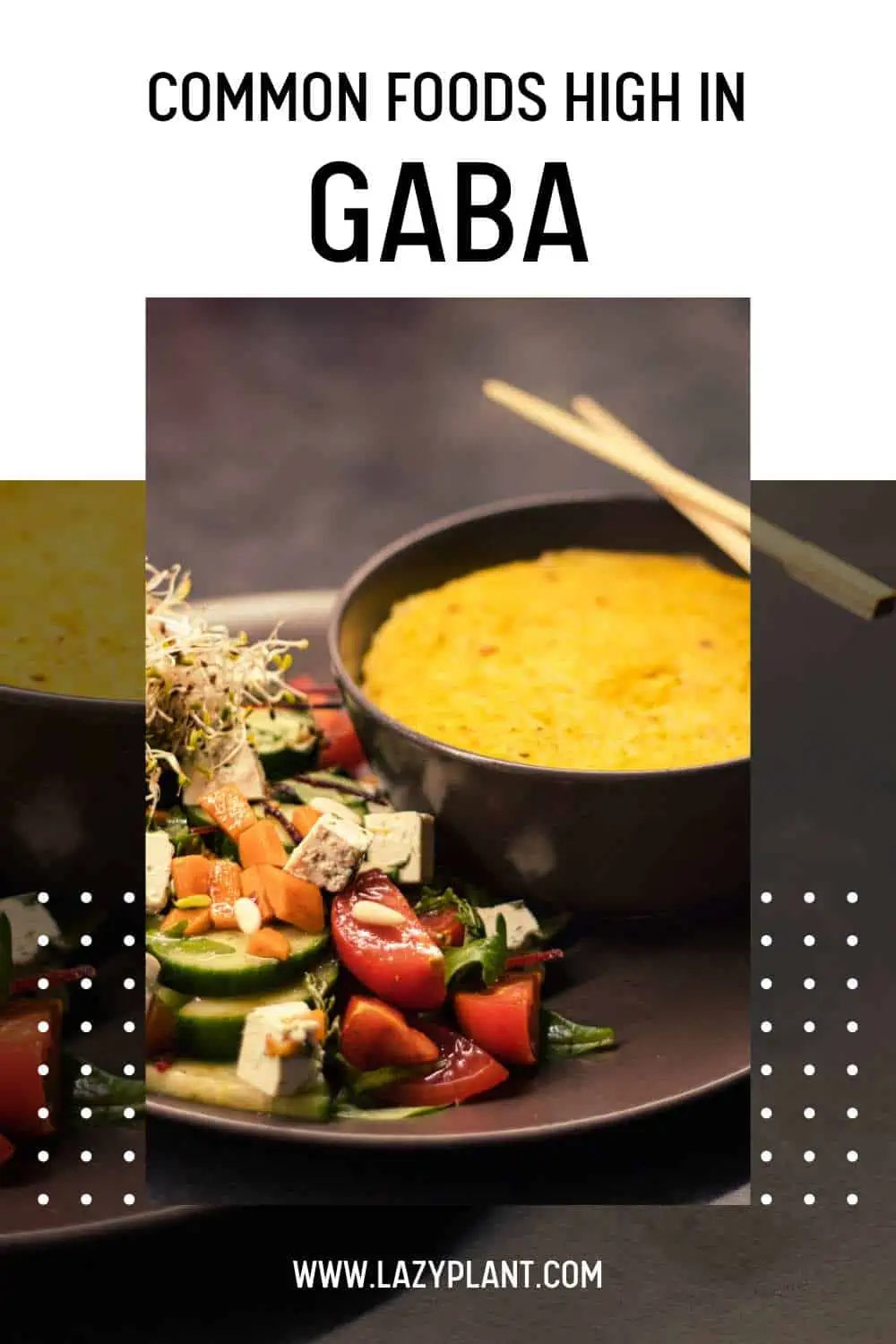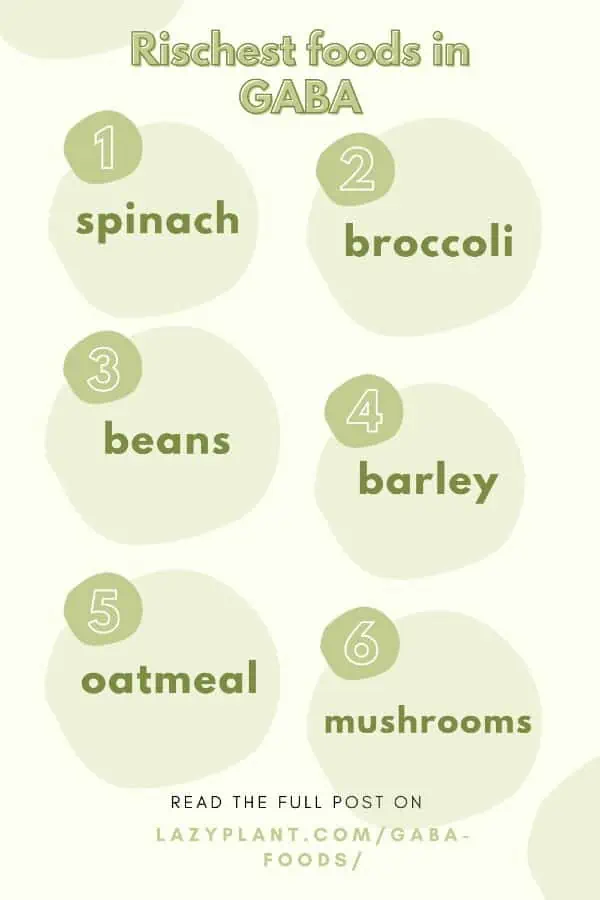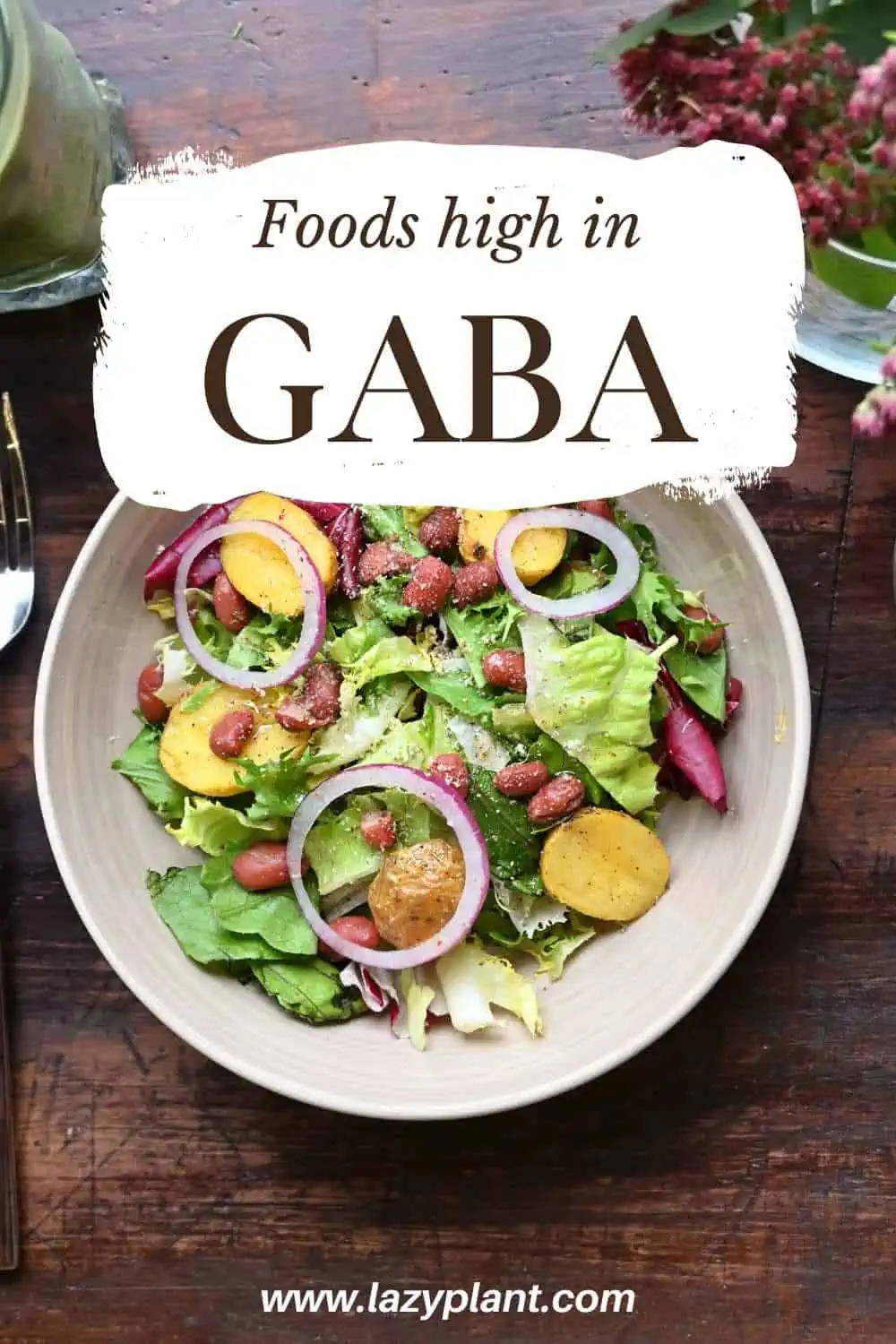Common foods high in GABA are:
- spinach
- broccoli
- tempeh
- soybeans
- green peas
- oatmeal
- wheat
- barley
- buckwheat
- potato
- tomato
- mushrooms
Also, we have to consume foods high in glutamate, vitamin B6, zinc, and magnesium to help the body synthesize GABA. Eating certain foods can naturally increase our GABA status!
What’s GABA?
GABA (Gamma aminobutyric acid) is a chemical that is involved in many functions of the human body. GABA acts as a neurotransmitter in the brain. It blocks/regulates certain brain signals. GABA is the primary inhibitory neurotransmitter in the brain and the spinal cord.[1]
In most cases, healthy people produce more than enough GABA. It’s produced by the nervous system and the insulin-producing beta-cells of the pancreas.[2]
However, we can get high amounts of GABA from food or dietary supplements.
Health benefits of GABA
Sleep & anxiety
GABA has many health benefits. Above all, GABA may relieve stress and anxiety. It improves your mood. Moreover, it seems to regulate the circadian rhythm, enhance memory, and improve night’s sleep quality.[3]
A daily dose of 100-300 mg of GABA seems to be enough for helping people with insomnia. For better results, you could eat lots of foods rich in melatonin. Melatonin is a hormone that helps you sleep better at night. Also, it enhances the action of GABA.[4]
High blood pressure
GABA can significantly decrease high blood pressure. Thus, consuming foods rich in GABA may be a safe way to regulate or prevent the development of hypertension without any adverse effects.[5]

Headaches
Furthermore, GABA may relieve you from migraines or headaches. Brain GABA levels are significantly higher in people with migraine, indicating a change in brain chemistry. GABA can modulate pain.[6]
Exercise
Moreover, GABA seems to be beneficial for athletes and active people. GABA may help athletes recover faster after exercise, and build more muscle mass, as it seems to increase the amount of the Human Growth Hormone![7]
Weight loss
GABA could significantly improve glucose tolerance, lower blood glucose levels, reduce insulin resistance, prevent pancreatic damage, and protect from developing type 2 diabetes.[8,9]
Last, but not least, GABA seems to play a key role in diet-induced obesity. It regulates food intake and helps control body weight. Hence, GABA might help overweight people lose weight.
A high-fat diet, not only increases the risk of obesity, but also it may lead to low levels of GABA! A high-fat diet disturbs the metabolism of glutamate, which is crucial for the synthesis of GABA.[10,11]
How much GABA do we need a day?
There isn’t a recommended daily intake of GABA. Most studies have used dosages of 100-300 mg, though. Daily doses up to 800 mg are considered pretty safe for most people.
In any case, you should consult your healthcare provider before taking any dietary supplement.
Foods high in GABA
Actually, plants are the richest foods in GABA. Foods particularly high in GABA are certain:
- vegetables: spinach, broccoli
- beans and bean-based foods: soybeans, tempeh. miso, green peas
- cereals: oatmeal, buckwheat, barley, wheat
- mushrooms
Vegetables
Spinach is one of the richest foods in GABA. It contains about 414 nmol of GABA per gram (dry weight). In fact, spinach is one of the best foods for weight loss.[12]
Broccoli is also an excellent natural source of GABA. It contains 77 nmol/g of GABA (dry weight). It’s another great food for weight loss.[13]
Beans
Beans such as Lupin, soy, and pea beans are also good dietary sources of GABA. Fermented soy products, such as tempeh and miso, are great natural sources of GABA as well.
Cereals
Grains, such as oats, wheat, barley, buckwheat, and rice are high in GABA as well.
Mushrooms
Additionally, certain mushrooms, like shiitake, are naturally rich in GABA.

Tomato, potato, sweet potato, kale, celery, chestnuts, and valerian are other common foods naturally high in GABA. They contribute to our daily intake.
The richest food in GABA
Last, but not least, if you want to naturally boost your daily intake of GABA, you should consume chlorella. Chlorella is a freshwater algae, which is particularly high in GABA, protein, and chlorophyll.
Chlorella contains 500 mg of GABA per 100g. Just 1 small chlorella tablet contains about 1 mg of GABA!
According to a study, participants improved their high blood pressure, by taking 20 mg of GABA from chlorella a day![5]
You can find a wide variety of chlorella or GABA supplements at best prices on iHerb; the biggest platform of supplements and wellness products.
Foods that naturally boost GABA synthesis
Furthermore, we can naturally increase GABA concentrations by consuming certain foods even if they contain no GABA.
The human body requires high amounts of glutamate, vitamin B6, zinc, and magnesium to synthesize GABA.
Foods rich in Glutamate
GABA is produced by the human body from glutamate. Glutamate is a non-essential amino acid. The human body can synthesize it. But, we can also get high amounts from our diet. For instance, good:
- animal-based foods are meat, fish, egg, and dairy.
- plant-based sources are wheat, tomato, soy, mushrooms, spinach, and instant coffee powder.
Foods rich in vitamin B6
Additionally, the body needs vitamin B6 as a cofactor to synthesize GABA. Common foods rich in vitamin B6 are pistachio nuts, sunflower seeds, chickpeas, walnuts, flaxseeds, banana, peanuts, potatoes, avocado, and peppers.
Furthermore, vitamin B6 supports weight loss.
Foods high in zinc
Zinc regulates the release of GABA. Oats, beans, Brazil nuts, walnuts, pumpkin seeds, and sesame seeds are only a few foods containing zinc.[14]

Magnesium affects GABA levels
Magnesium affects GABA responses.[15]
Common foods rich in magnesium are pumpkin seeds, chia seeds, flaxseeds, spinach, almonds, cashews, walnuts, milk, oats, beans, and even water.